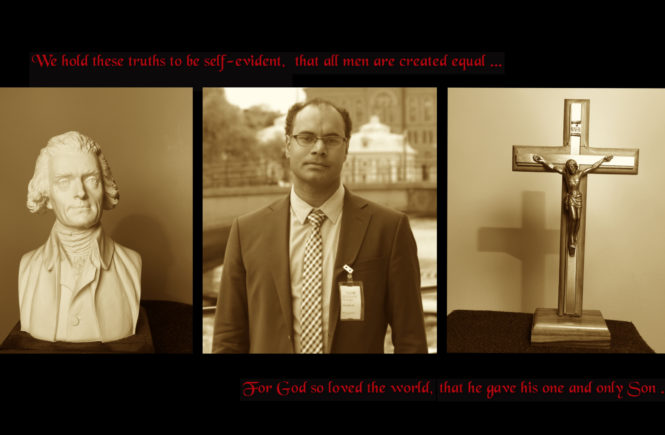Ronie Berggren inleder påsken med en reflektion om Thomas Jefferson och Jesus från Nasaret.
——–
Av Ronie Berggren:
Den 20 februari sammanfattade jag i artikeln ”Thomas Jeffersons ideologiska fyrtorn lyser genom historiens stormar”, USA:s. tredje president Thomas Jeffersons händelserika liv.
Jefferson är mitt ideologiska föredöme sedan tonåren. Han är vår tids viktigaste politiska filosof, och på samma sätt som det nästan är omöjligt att överskatta hans betydelse för framväxten av våra moderna demokratier, så går det inte att för ofta påminna om de ord han författade i den amerikanska frihetsdeklarationen:
”We hold these truths to be self-evident, that all men are created equal, that they are endowed by their Creator with certain unalienable Rights, that among these are Life, Liberty and the pursuit of Happiness.
That to secure these rights, Governments are instituted among Men, deriving their just powers from the consent of the governed”
Jefferson dog 1826 och sedan dess har många människor, inklusive jag, kommit att fascineras av honom. Samma fascination som jag har för Thomas Jefferson, hade Jefferson till Jesus från Nasaret.
Jefferson var visserligen en av de mer religionsskeptiska av USA:s överlag väldigt kristna författningsfäder. Han var ett barn av sin strikta akademiska upplysningstid, och ansåg att såväl apostlar som pastorer omgärdat Jesus med metafysiska myter som inte gick att tro på. Han var också en skarp kritiker av katolska kyrkan.
Men han var inte någon pre-ateist som människor som exempelvis Christopher Hitchens eller Sam Harris och andra som lärt sig om Jefferson via dessa, försöker framställa honom som. Faktum är att Jefferson själv bemötte ryktena om hans påstådda anti-kristendom, och 1803 skrev han följande i ett brev till vännen Dr Benjamin Rush:
”Dear sir: In some of the delightful conversations with you, in the evenings of 1798-99 … the Christian religion was sometimes our topic; and I then promised you that one day or other, I would give you my views of it. They are the result of a life of inquiry and reflection, and very different from that Anti-Christian system imputed to me by those who know nothing of my opinions.”
Han fortsatte sedan förklara att han förvisso motsatte sig korruptionen inom kristendomen men inte Jesus så som han beskrivit sig själv:
”To the corruptions of christianity I am indeed opposed; but not to the genuine precepts of Jesus himself.
I am a Christian in the only sense in which he wished any one to be; sincerely attached to his doctrines, in preference to all others”
Brevet utgör inledningen till den bok Jefferson sedan skrev, ”The Life and Morals of Jesus of Nazareth”.
En bok jag först läste när jag var kring 20 och så här i påsktider tänkte passa på att skriva några rader om. Jefferson ansåg Jesus vara vida överlägsen Antikens alla andra filosofer. Om Platon skriver Jefferson följande:
”Plato … only used the name of Socrates to cover the whimsies of his own brain”
Och till Profeten Muhammed, lyckas Christopher Hitchens i sin bok ”Thomas Jefferson: Author of America” skildra Jeffersons inställning genom att beskriva mötet med Tripolis ambassadör Abdrahaman i London under 1780-talet. När Jefferson frågade denne med vilken rätt de muslimska piraterna kidnappade amerikaner och plundrade amerikanska skepp fick han då ett svar han skrev följande om:
”The Ambassador answered us that it was founded on the Laws of the Prophet, that it was written in their Koran, that all nations who should not have answered their authority were sinners, that it was their right and duty to make war upon them wherever they could be found, and to make slaves of all they could take as prisoners.”
Jefferson röjer inte sina egna tankar, men Hitchens kommenterar:
”It is hard to imagine a better summary of all that Jefferson disliked, both about monarchy and religion”
Sant i förhållande till Muhammed, men inte i förhållande till Jesus. Om Jesus från Nasaret hade Jefferson betydligt mer att säga:
”He was meek, benevolent, patient, firm, disinterested, and of the sublimest eloquence.”
Och om Jesu lära därefter:
”… a system of morals is presented to us which, if filled up in the true style and spirit of the rich fragments he left us, would be the most perfect and sublime that has ever been taught by man.
…His moral doctrines, relating to kindred and friends, were more pure and perfect than those of the most correct of the philosophers, and greatly more so than ’those of the Jews; and they went far beyond both in inculating universal philanthropy, not only to kindred and friends, to neighbors and countrymen, but to all mankind, gathering all into one family, under the bonds of love, charity, peace common wants and common aids. A development of this head will evince the peculiar superiority of the system of Jesus over all others.”
I ”The Life and Morals of Jesus of Nazareth” eller ”The Jefferson Bible” som den också har kallats, har Jefferson sedan precis samma inställning till Jesus, som jag till Jefferson – nämligen att Jesus inte behöver kommenteras, utan att hans egna ord talar för sig själv.
I boken som är en lång sammanställning av Jesu liv – förtäljs berättelsen om Jesus utifrån Jesu egna ord så som de återfinns i de fyra evangelierna. Det är samma fascination som kristna av betydligt mer kyrklig tro hyser. Här följer några sammanfattande citat, följt av några egna reflektioner.
”AND it came to pass in those days, that there went out a decree from Caesar Augustus, that all the world should be taxed. (And this taxing ways first made when Cyrenius was governor of Syria.) And all went to be taxed, every one into his own city.
And Joseph also went up from Galilee, out of the city of Nazareth, into Judaea, unto the city of David, which is called Bethlehem, (because he was of the house and lineage of David,) To be taxed with Mary his espoused wife, being great with child.
And so it was, that, while they were there, the days were accomplished that she should be delivered. And she brought forth her firstborn son, and wrapped him in swaddling clothes, and laid him in a manger; because there was no room for them in the inn.
And when eight days were accomplished for the circumcising of the child, his name was called JESUS.
And when they had performed all things according to the law of the Lord, they returned into Galilee, to their own city Nazareth.”
Han citerar vidare Jesu egna ord:
”AND one of the scribes came, and having heard them reasoning together, and perceiving that he had answered them well, asked him, Which is the first commandment of all?
And Jesus answered him, The first of all the commandments is, Hear, O Israel; The Lord our God is one Lord:
And thou shalt love the Lord thy God with all thy heart, and with all thy soul, and with all thy mind, and with all thy strength: this is the first commandment.
And the second is like, namely this, Thou shalt love thy neighbour as thyself. There is none other commandment greater than these.
On these two commandments hang all the law and the prophets.”
Och vidare:
”And when thou prayest, thou shalt not be as the hypocrites are: for they love to pray standing in the synagogues and in the corners of the streets, that they may be seen of men. Verily I say unto you, They have their reward.
But thou, when thou prayest, enter into thy closet, and when thou hast shut thy door, pray to thy Father which is in secret; and thy Father which seeth in secret shall reward thee openly.But when ye pray, use not vain repetitions, as the heathen do: for they think that they shall be heard for their much speaking.
Be not ye therefore like unto them: for your Father knoweth what things ye have need of, before ye ask him.
After this manner therefore pray ye: Our Father which art in heaven, Hallowed be thy name.
Thy kingdom come. Thy will be done in earth, as it is in heaven.
Give us this day our daily bread.
And forgive us our debts, as we forgive our debtors.
And bad us not into temptation, but deliver us from evil: For thine is the kingdom, and the power, and the glory, for ever. Amen.
For if ye forgive men their trespasses, your heavenly Father will also forgive you:
But if ye forgive not men their trespasses, neither will your Father forgive your trespasses. ”
Jefferson var privat med sin tro, men förklarar i brevet till Dr Rush att han trodde på Gud – en Gud han vid flertalet tillfällen nämner i den amerikanska frihetsdeklaration han författade – och det goda i den judiska monoteismen, som dock var i stort behov av reform – en reform Jesus medförde. Han skrev om Jesus:
”He corrected the Deism of the Jews, confirming them in their belief of one only god, and giving them juster notions of his attributes and government.”
Jeffersons berättelse om Jesus – är berättelsen om Jesus från Nasaret, inte berättelsen om Jesus Kristus. Det är en berättelse nästan utan skildringar av mirakler, och Jefferson avslutar med begravningen – inte med uppståndelsen.
Jefferson älskade Jesus, för det Jesus själv sa. Det är dock omöjligt att citera Jesus utan att inte också citera ord om Gud, himlen och evigheten – eftersom det inte bara var apostlarna utan även Jesus själv som talade om detta. Som citaten ovan visar, så avfärdar Jefferson inte det. Något även detta citat ger exempel på:
”The same day came to him the Sadducees, which say that there is no resurrection, and asked him. Saying, Master, Moses said, If a man die, having no children, his brother shall marry his wife, and raise up seed unto his brother.
Now there were with us seven brethren: and the first, when he had married a wife, deceased, and, having no issue, left his ”wife unto his brother: Likewise the second also, and the third, unto the seventh. And last of all the woman died also. Therefore in the resurrection whose wife shall she be of the seven? for they all had her.
Jesus answered and said unto them, Ye do err, not knowing the scriptures, nor the power of God. For in the resurrection they neither marry, nor are given in marriage, but are as the angels of God in heaven.
But as touching the resurrection of the dead, have ye not read that which was spoken unto you by God, saying, I am the God of Abraham, and the God of Isaac and the God of Jacob? God is not the God of the dead, but of the living.
And when the multitude heard this, they were astonished at his doctrine.”
Trodde Jefferson att Jesus var Guds son? Trodde Jefferson på Jesu återkomst?
Det gjorde han förmodligen inte – likväl hade Jefferson precis som USA:s andra författningsfäder en djup förståelse för kristendomens betydelse för det statsskick man i USA just lagt grunden till.
I sin bok ”Democracy in America”, som utkom cirka trettio år efter att Jefferson skrivit sin bibel, skulle fransmannen Alexis de Tocqueville efter sin rundresa i Förenta staterna på 1830-talet beskriva USA:s unika förhållande mellan religion och frihet:
”I have already said enough to reveal Anglo-American civilization in its true light. It is the product (and this point of departure must always be kept in mind) of two perfectly distinct elements that elsewhere are often at odds. But in America, these two have been successfully blended, in a way, and marvelously combined. I mean the spirit of religion and the spirit of liberty.”
Jeffersons personliga fascination för Jesus var lika stor som James Madisons och de andra betydligt mer utpräglat kristna författningsfäderna, som te x Noah Webster, som skrev följande:
“The brief exposition of the Constitution of the United States will unfold to young persons the principles of republican government. It is the sincere desire of the writer that our citizens should early understand the genuine source of correct republican principles is the Bible, particularly the New Testament of the Christian religion.“
Jefferson var fascinerad av Jesus, på samma sätt som jag är fascinerad av Jefferson – en fascination som bäst beskrivs, med ett direkt bibelcitat, om just Jesus – som passar perfekt som avslutning på denna reflektion om både Thomas Jefferson och Jesus från Nasaret – ett stycke om när fariséerna sände ut män för att låta gripa Jesus:
”… and the Pharisees and the chief priests sent officers to take him. So there was a division among the people because of him.
And some of them would have taken him; but no man laid hands on him.
Then came the officers to the chief priests and Pharisees; and they said unto them, Why have ye not brought him?
The officers answered, Never man spake like this man.”
Glad påsk!
Ronie Berggren
—————
Relaterat: Thomas Jeffersons ideologiska fyrtorn lyser genom historiens stormar (2018-02-20)



